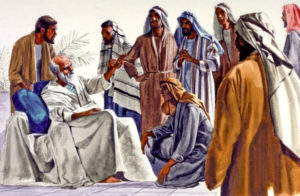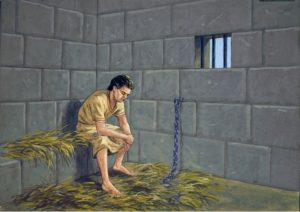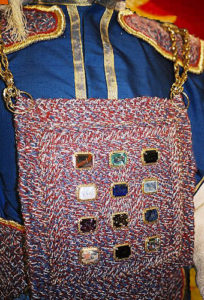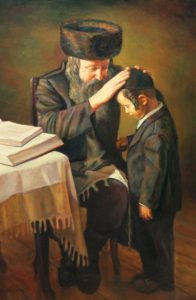Vayichi 2017 – Dead & Alive or Yaakov’s Non-Jewish Grandchildren
by devadmin | January 12, 2017 8:53 pm
We begin with mamish givaldige and exciting news as we announce the engagement of Brocha Libman, the beautiful daughter of Chevi and Rabbi Dovid Libman, to Nosson Yehuda Bloch, he the son of Ephraim & Sonja Bloch. Few boys who had Reb Dovid as a rebbe ever forget him; neither do we, the parents. We are forever indebted to him for his heart, smile and warmth know no bounds. His eishes chayil Chevi, just as nice.
And a big mazel tov and a very happy 39th anniversary to our very close friends Judith & Shlomo Gottesman. Who knew people, in our times, stay married that long?
Raboyseyee and Ladies:
Dead & Alive
Yaakov’s Non-Jewish Grandchildren
Can one be dead and also alive at the same time? In yeshiva parlance, were one to ask that question, the rebbe would retort with a ‘patch in punim’ (smack in the face) and state emphatically ‘freyg nisht keyn klutz kashas’ (don’t ask stupid questions). Ober, is there an answer? Of course not! One is either dead or alive. Well of course not; until you read what the heylige Gemora has to say on this week’s parsha of Vayichi. Interestingly, the great majority of the parsha concerns itself with the passing of Yaakov. His dying wishes, his death, embalmment, funeral arrangements, the procession to the burial site, and the funeral itself, are all surprisingly and vividly described. Ober, did he really die? Is there still one vacancy in the cave? We shall explore that below, ober we begin with two comments received on last week’s review of parshas Vayigash and with a third not related but worthy of inclusion. Y’rachmiel from Dallas asked three different questions, one a bomb mamish, in his comment, and Carol, from Louisville KY (a city many large companies use to test market new products) asked a strong kasha as well.
 Let’s read them along with one more from Jeff W out of Cleveland, his containing both praise and rebuke. Before we do…the Oisvorfer is always delighted to receive comments from readers around the country and world. It’s mamish heartwarming and somewhat astounding to see how his review has grown over the past seven years.
Let’s read them along with one more from Jeff W out of Cleveland, his containing both praise and rebuke. Before we do…the Oisvorfer is always delighted to receive comments from readers around the country and world. It’s mamish heartwarming and somewhat astounding to see how his review has grown over the past seven years.
_________________________________________________
Joseph tells his brothers that it was God, not they, who sent him to Egypt for the purpose of saving folks from famine. How did Joseph know that this was God’s plan? If it really was God’s plan, couldn’t He have found a simpler one? What becomes of the brothers’ free will? Have they no responsibility then for their “great” deed?
Yrachmiel
Dallas
_________________________________________________
Perhaps Joseph feared for his life if he were to return to see his father (if that were even possible as a slave or an advisor to a king). What then was his duty: to his father at the risk of his life, or to his master with the ability to spare the lives of many Egyptians?
Carol
Louisville, KY
_________________________________________________
My dearest Oisvorfer!!
The entire Shul here is in anticipation of this week’s parsha post, we are betting you will again mock the fact that Yosef was asked to put the hand under Yakov’s thigh… you clearly love that topic, all the way back to Avrohom Avinu. Pls if possible keep things respectful and refrain from writing offensive garbage, you don’t need to, you have plenty to say without that…
Jeff W.
_________________________________________________
Nu, ladies first. Let’s address Carol who suggests through her question that Yoisef had no choice -given his position: he could not seek out his father. Ober Carol, a few of our sages and rabbis took Yoisef to task anyway. Perhaps deservedly so. Efsher Paroy would not have granted permission, ober did Yoisef ask? Did he make an attempt, even one, to let his long suffering father know he was alive though maybe not always too well? Could he not at some point -especially after rising to power- have sent a messenger? A homing pigeon? A letter? An instant message, a text, epes? Was Yoisef feeling rejected? We shall address rejection later on.
As to Y’rachmiel (seemingly spelled chosare- without an ‘i’ or ‘e’ following the Y) and his three questions, says the Oisvorfer azoy: Your questions, especially the one regarding free will, are mamish givaldig and deep. This question has plagued many Yiddin and has vexed the Oisvorfer for decades. Do we taka have free will? And if we do, how does that concept reconcile with what myriad rebbes the Oisvorfer had (at several yeshivas) taught him over and again? All is bashert, all is preordained, they kept insisting. Fartig and case closed! Ober, to the naked eye -though not to the at times half-naked rebbe, these two concepts are mutually exclusive. Are they? Nu, let’s begin with the easy answers. Could the RBSO not have found a simpler plan for Yoisef? Why was it necessary for Yoisef to endure years of anguish and unnecessary suffering? Avada he could have! He can do anything!
 Ober, as we all know, the RBSO works in mysterious ways. Let’s not forget Yoisef’s dream wherein he saw his brothers bowing down to him. When 22 years later, this part of his dream materialized, as described in last week’s parsha, Yoisef recognized the master plan. He came to terms with all that had befallen him. He chapped that the RBSO set all this into motion so that one day he would wind up in the King’s palace in a position to help his own family. Grada the Oisvorfer knows a fellow who was mamish down on his luck. He lost all his money. His wife left him and he also wound up in prison. What happened next? Shoin, there he met another Yid, by chance a billionaire. They became friendly. The billionaire offered him a job upon release and today the man is back on his feet with a new wife and life. He swears that the RBSO arranged all these events. Ober did the RBSO arrange his crime in order that he go to prison and wait for the billionaire to arrive? Mistama not; though it might have made for a novel defense. Instead the RBSO allowed him to exercise his free will and end up in prison. Ober it was preordained for him to meet the billionaire and shoin.
Ober, as we all know, the RBSO works in mysterious ways. Let’s not forget Yoisef’s dream wherein he saw his brothers bowing down to him. When 22 years later, this part of his dream materialized, as described in last week’s parsha, Yoisef recognized the master plan. He came to terms with all that had befallen him. He chapped that the RBSO set all this into motion so that one day he would wind up in the King’s palace in a position to help his own family. Grada the Oisvorfer knows a fellow who was mamish down on his luck. He lost all his money. His wife left him and he also wound up in prison. What happened next? Shoin, there he met another Yid, by chance a billionaire. They became friendly. The billionaire offered him a job upon release and today the man is back on his feet with a new wife and life. He swears that the RBSO arranged all these events. Ober did the RBSO arrange his crime in order that he go to prison and wait for the billionaire to arrive? Mistama not; though it might have made for a novel defense. Instead the RBSO allowed him to exercise his free will and end up in prison. Ober it was preordained for him to meet the billionaire and shoin.
Ober how taka does all this work? Is there free will? Let’s review the posik in last week’s parsha which gave rise to Y’rachmiel’s question. Says the heylige Toirah (Bereishis 45:8) azoy: “And now -it was not you who sent me here but Hashem; He had made me a father to Paroy, master of his entire household, and ruler throughout the entire land of Egypt.” OMG! It was with these words that Yoisef seemingly realized that events going back to his encounter with his holy brothers and all else which befell him on his 22 year journey, were but orchestrated by none other than the RBSO. They may have taka intended to get rid of him, seemingly murder was on their minds. According the heylige Gemora, they convened a Din Torah (Rabbinical Court) and sentenced him to death. Why? Yoisef’s dreams made them mishugah. Sibling jealousy perhaps? His multi colored tunic efsher? Ober the RBSO had other plans. He intervened. He caused Reuvain to suggest not to kill him and then caused Yehudah to suggest a sale into slavery. So, which was it? Free will of the plotting brothers? Or, the preordained will of the RBSO? Do we have free will? Does the RBSO allow us to exercise our free will at all times? Anytime? Are we free to move about the cabin as desired? Or, is it farkert; is everything preordained? Are our actions seemingly carried out using free will but playing out what was ordained above? It’s so damn confusing.

Nu, so happens that by chance mamish (free will) the Oisvorfer ran into a totally non-observant chaver earlier this week. His mother is Jewish, ober his father not so much. In fact, he’s a goy! For reasons that remain inexplicable, he was holding two books in his hands. The English version of the “Choivas Halvovois” (Duties of the Heart), and the book “Talmud for Dummies.” In response to the questions “where did you get these, and why are you reading them,” he answered: “I am searching and they were recommended.” Shoin, the Oisvorfer asked to borrow them for a few hours. Ober was the Oisvorfer exercising free will? Or, did the RBSO preordain and pre-arrange the encounter in order to properly address Y’rachmiel’s questions? In any event, as the Table of Contents was being perused, staring the Oisvorfer right in the face, was the answer to his question on free will. Says the good book azoy:
Both are true! We have free will, ober all is preordained. How could that be? Nu, if Yaakov could be dead and also alive as we will shortly read, why can’t you chap that we have free will, and yet, all is still preordained? Who says you need to chap how all this works? Do you chap how when you push the power button on your remote, the TV turns on and offers you hundreds of channels? Do you chap how your radio works, how your wife thinks, or how a cruise ship stays afloat? As an aside, the Choivas Halvovois does not ask these questions. Says the author azoy: We humanoids live our lives and make decisions mistakenly thinking and believing that we have free will. Ober, those actions and decisions notwithstanding, the RBSO will arrange our actions, or the results of our actions, so that they fit what He has, or had in mind. If your free will decisions fit His narrative, they will stand. If not, though you took actions and did whatever you thought was your free will, He will arrange things so that they work out as He had them preordained. In other words: If you feel like going to Vegas and do just that, ober the RBSO wanted you in Miami instead, He will -doing what He does- create a set of circumstances that will somehow get you there with or without your cooperation. Mamish gishmak.
Or, as found in the Idiot’s Guide where the RambaM (Maimonides) is quoted on this subject: “It’s God’s will that we have free choice.” How gishmak is that? The bottom line: While pursuing our free will, we don’t necessarily know if our actions are aligned with what the RBSO wants or will allow. We don’t know if our actions are good or bad. (Mostly they are bad!) We don’t know if our free will actions will be rewarded, or result in us winding up in a heap of trouble. And if we do end up in trouble, is that what He, the RBSO, ultimately wanted and preordained in order for the rest of His plan to evolve? Ver veyst? For Yoisef, and countless others, it all -after a number of years which included many trials and tribulations- worked out. And if it hasn’t quite worked out for you, you need to believe that it ultimately will. If ultimately it doesn’t, efsher it was preordained not to, ver veyst. Shoin, that was way too heavy. Needless to say, the Oisvorfer immediately returned both books and went back to reading ‘Seinfeldia,’ a new and much easier read about nothing.
 Shoin let’s review the parsha ober not before we address reader Jeff W. from Cleveland. Grada Jeff did not tell us from whence he wrote, ober his IP address traced him back to somewhere in Cleveland. Nu Jeff, thank you for your mamish gishmake comment which as mentioned above was complimentary but also contained a shtikel rebuke. Grada, the combination of compliment and rebuke, will be found in our parsha when Yaakov assembles his kids for final blessings. This past Monday when the Oisvorfer sat down to once again review the parsha, he taka came across the swearing incident. Yaakov will, as did Avrohom with Eliezer, ask that Yoisef swear by placing his hand under Yaakov’s ‘yerech.’ Rashi told us way back in parshas Chaya Soro that ‘yerech’ was a euphemism for penis. And taka the Oisvorfer was thinking whether or not to grab the subject and run with it. That was Monday. A mental note was made to davka try and avoid this hands-on topic; been there and previously well covered. Nu, it’s taka emes that Avrohom had no other mitzvah to grab onto (we were previously taught that as a condition precedent, the one swearing must grab onto an item of mitzvah in order to make the oath valid) and therefore back then Avrohom who had but one commanded Mitzvah, chose the milah (penis). Ober, if indeed Yaakov kept and observed the entire heylige Toirah as does a medrish or two and the heylige Gemora proffer, why did he not have Yoisef grab onto any other mitzvah in order to effectuate the oath? Nu, efsher we can kler azoy: As to why Yaakov, so many years later, still insisted on the ‘yerech grab’ in order to ensure that Yoisef would indeed do as he swore -mainly not to bury his father in Mitzrayim- efsher we can kler azoy: Minhag Avoisaynu B’iyodaynu, if you chap. It’s a tradition. We don’t mess with tradition!
Shoin let’s review the parsha ober not before we address reader Jeff W. from Cleveland. Grada Jeff did not tell us from whence he wrote, ober his IP address traced him back to somewhere in Cleveland. Nu Jeff, thank you for your mamish gishmake comment which as mentioned above was complimentary but also contained a shtikel rebuke. Grada, the combination of compliment and rebuke, will be found in our parsha when Yaakov assembles his kids for final blessings. This past Monday when the Oisvorfer sat down to once again review the parsha, he taka came across the swearing incident. Yaakov will, as did Avrohom with Eliezer, ask that Yoisef swear by placing his hand under Yaakov’s ‘yerech.’ Rashi told us way back in parshas Chaya Soro that ‘yerech’ was a euphemism for penis. And taka the Oisvorfer was thinking whether or not to grab the subject and run with it. That was Monday. A mental note was made to davka try and avoid this hands-on topic; been there and previously well covered. Nu, it’s taka emes that Avrohom had no other mitzvah to grab onto (we were previously taught that as a condition precedent, the one swearing must grab onto an item of mitzvah in order to make the oath valid) and therefore back then Avrohom who had but one commanded Mitzvah, chose the milah (penis). Ober, if indeed Yaakov kept and observed the entire heylige Toirah as does a medrish or two and the heylige Gemora proffer, why did he not have Yoisef grab onto any other mitzvah in order to effectuate the oath? Nu, efsher we can kler azoy: As to why Yaakov, so many years later, still insisted on the ‘yerech grab’ in order to ensure that Yoisef would indeed do as he swore -mainly not to bury his father in Mitzrayim- efsher we can kler azoy: Minhag Avoisaynu B’iyodaynu, if you chap. It’s a tradition. We don’t mess with tradition!
 This past shabbis, the Oisvorfer confronted a godoil (big guy) out of Lakewood, New Jersey where many thousands have gone into retirement without ever having worked a day in their lives. Instead, they spend a few hours a day toiling over the folios of the heylige Gemora and other holy books. During previous encounters, we have sparred over Reuvain, Shimon & Levi’s bar mitzvah dates, Yehudah’s and Dovid Hamelech’s indiscretions, and more. The godol declares them all innocent. He points to the heylige Gemora to back up his position. Ober says the Oisvorfer: let’s get real. They all sinned! The Oisvorfer points to the heylige Toirah which tells us in more than one place that Reuvain, and Shimon & Levi sinned. And the Novee tells us- as does Dovid Hemelech himself- that he sinned. As to Leah’s three oldest boys, Yaakov will, in this week’s parsha remind each of them of their sins, and will in the case of Reuvain, excoriate him one more time before meting out what he considers just punishment. Because Reuvain either stripped the bed, or himself if you chap, when he either moved or mounted the bed -mistama with Bilah on it- he will be stripped of his birthright blessings which in those days -may have- included the priesthood, royalty, and a double portion of Yaakov’s assets.
This past shabbis, the Oisvorfer confronted a godoil (big guy) out of Lakewood, New Jersey where many thousands have gone into retirement without ever having worked a day in their lives. Instead, they spend a few hours a day toiling over the folios of the heylige Gemora and other holy books. During previous encounters, we have sparred over Reuvain, Shimon & Levi’s bar mitzvah dates, Yehudah’s and Dovid Hamelech’s indiscretions, and more. The godol declares them all innocent. He points to the heylige Gemora to back up his position. Ober says the Oisvorfer: let’s get real. They all sinned! The Oisvorfer points to the heylige Toirah which tells us in more than one place that Reuvain, and Shimon & Levi sinned. And the Novee tells us- as does Dovid Hemelech himself- that he sinned. As to Leah’s three oldest boys, Yaakov will, in this week’s parsha remind each of them of their sins, and will in the case of Reuvain, excoriate him one more time before meting out what he considers just punishment. Because Reuvain either stripped the bed, or himself if you chap, when he either moved or mounted the bed -mistama with Bilah on it- he will be stripped of his birthright blessings which in those days -may have- included the priesthood, royalty, and a double portion of Yaakov’s assets.
Last week we asked where we can find a single word, sentence or anything else, confirming that the brothers were good guys, efsher even tzadikim (righteous) and deserving of selection as the shevotim being worthy of adorning the breastplate of the koihen Godol. In the end we could not find any. When the Lakewood godol was asked, he offered the following. Didn’t Reuvain, convince the brothers not to kill Yoisef but instead -like a tzadik mamish- first strip him of his shirt -efsher more- and then throw him into a pit laden with snakes and scorpions? So says Rashi and who knew better. Such a fine man indeed! He also mentioned that Reuvain was not present when the brothers sold Yoisef into slavery because he was off donning a sackcloth feeling remorse over his complicity in the entire bed moving fiasco. Then he argued that Shimon and Levi were saints because they stood up for their sister’s honor following her abduction and rape by Shechem and declared -hachizoina ya’a’seh es achoisaynu?! (should he treat our sister like a whore)!? Taka that was nice of them, ober what right did they have to kill out the entire city of its male inhabitants? Did they convene a din-torah, or take them to a local court? Or, were they acting as vigilantes? Nonetheless, the Oisvorfer accepted that Shimon and Levi were good guys. And Yehudah? Did he not go roadside and pay for favors and then condemn the service provider to death until he found out she was his own former daughter in law? Ober said the godol that Yehudah was a good man anyway. Why? Because he did declare “Tzodko Mimeni” – she is more correct than am I. The Oisvorfer accepted that Yehudah was a penitent and of course a good man.
 Ober the Oisvorfer asked azoy? What about the others? Where in the heylige Toirah can we find any descriptive words to convince those with questions that the others too were righteous? Where in the heylige Gemora can we find our rabbis discussing their virtuous, even in the medrish, and even if apocryphal? Efsher Zivulin helped an old lady cross the street? Perhaps Osher returned a lost item. Efsher Gad & Naftoli attended the famous yeshiva of Sheym & Eyver where was they were immersed in learning? Ober gornisht; we find nothing! Said the Godol who has been immersed in studies for years “let me think about it.” Nu, he is seemingly still thinking.
Ober the Oisvorfer asked azoy? What about the others? Where in the heylige Toirah can we find any descriptive words to convince those with questions that the others too were righteous? Where in the heylige Gemora can we find our rabbis discussing their virtuous, even in the medrish, and even if apocryphal? Efsher Zivulin helped an old lady cross the street? Perhaps Osher returned a lost item. Efsher Gad & Naftoli attended the famous yeshiva of Sheym & Eyver where was they were immersed in learning? Ober gornisht; we find nothing! Said the Godol who has been immersed in studies for years “let me think about it.” Nu, he is seemingly still thinking.
Ober while the godol was, and is still thinking, so was the Oisvorfer. It’s taka emes that Yaakov severely rebuked Reuvain’s actions when telling him that he acted impetuously. Ober, would it not have been much worse a transgression had Reuvain mounted the bed after carefully and deliberately planning the entire event? Duh!! Shouldn’t the fact that he acted impetuously -in the heat of the moment- help mitigate his sin? And shouldn’t that factoid have also helped mitigate Yaakov’s anger? Efsher his mounting was but a spur of the moment action, no malice intended? Many are! He needed a release, if you chap. Efsher, he gazed upon Bilah while she was bathing? Hey, Dovid did that; it worked out just fine for him. Efsher she was making the bed and while bent over, he chapped a peek when suddenly his urges took over as they did for Yehudah when he traveled and arranged a roadside quickie. Nu, who are we to judge him? Perhaps Yaakov should have given him a pass? Moreover, didn’t Reuvain atone by fasting and donning a sackcloth for the Bilah bed mount? He fasted and wore a sackcloth? So says the heylige Gemora (Kidushin 82b). In other words: didn’t Reuvain do tshuvah? Was he not a penitent? So we are taught. And if he did, why was Yaakov still pissed off so many years later to a point where moments before passing away -assuming he did- he still had this incident on his mind and chose to excoriate him? Was his tshuvah not sincere or accepted?
 Ober efsher we can kler azoy: who says that Yaakov’s words were in fact a rebuke? Efsher we need to re-read them and chap they his rebuke was instead his blessing. Efsher it was Yaakov’s intention merely to point out to Reuvain, Shimon and Levi, unique character traits of theirs which required immediate attention and repair? Absent of Yaakov specifically mentioning that Reuvain’s personality included the negative trait of impetuosity, perhaps Reuvain would not know, nor would he be able to change. In other words: Yaakov was but playing doctor. A good doctor must tell the patient he is sick and how to go about getting healthy. Yaakov was merely plugging the holes in the personalities of his three older boys. Grada Reuvain knew a thing or two about hole plugging, if you chap. Indeed he did. So did Yehudah.
Ober efsher we can kler azoy: who says that Yaakov’s words were in fact a rebuke? Efsher we need to re-read them and chap they his rebuke was instead his blessing. Efsher it was Yaakov’s intention merely to point out to Reuvain, Shimon and Levi, unique character traits of theirs which required immediate attention and repair? Absent of Yaakov specifically mentioning that Reuvain’s personality included the negative trait of impetuosity, perhaps Reuvain would not know, nor would he be able to change. In other words: Yaakov was but playing doctor. A good doctor must tell the patient he is sick and how to go about getting healthy. Yaakov was merely plugging the holes in the personalities of his three older boys. Grada Reuvain knew a thing or two about hole plugging, if you chap. Indeed he did. So did Yehudah.
And if that theory has legs, efsher we can kler that Yaakov similarly just pointed out that Shimon and Levi needed anger management therapy. They acted out by killing all the Shechemites -in anger mamish- before thinking. And taka the words of the posik (Bereishis 49: 7) which states “Cursed is their anger for it is powerful, and their rage, for it is callous.” Yaakov did not curse them personally; he cursed only their anger.
And we close with one more topic. Nu, earlier we asked if Yaakov could be both alive and dead at the same time. Let’s quickly explore why this is a discussion item. Following the gishmake brochois only a father can give, Yaakov passed away at the age of 147. Did he? Expired, yes, but died? The heylige Gemora is not so sure he ever died. Says the heylige Toirah azoy: “When Yaakov finished instructing his sons, he drew his feet onto the bed, he expired and was gathered to his people.” Rashi, quoting the heylige Gemora, comments, “It does not say that he died . He lives forever.” Said Rebbe Yoichanan, in the Gemora, “Our father Yaakov, did not die. Rebbe Nachman asks, “Did the mourners eulogize him and the embalmers embalm him for nothing?” Rebbe Yoichanan quotes the verse in Yirmiyahu: “Have no fear, my servant Yaakov for behold I will save you from afar and your descendants from the land of return.” Just as his descendants are alive, so too is he. Efsher you are klerring azoy: how could this be when the Toirah explicitly states that Yaakov was embalmed and buried? Ober, not to worry: it’s all in the medrish and in the heylige Gemora where they can make everything fit and come to life. Even Yaakov. Gishmak. We just need to believe. Not convinced yet? Let’s read some more.
 On the one hand, we can interpret this statement homiletically: Yaakov lives on through later generations. As long as his descendants, the Bnei Yisrael, are alive and following his legacy, he lives on. Still one has to wonder how Rebbe Nachman accepted this answer. The Toirah explicitly states that Yaakov was embalmed and buried. He answers that every verse in the Toirah must incorporate the words of our Sages, even when logic dictates otherwise. When Rebbe Yoichanan states his interpretation, it is not just a homiletic exercise, but a mesorah (tradition) going back to Sinai. It defines the meaning of the verse: his embalmment must be understood in that context he only appeared to be dead. This concept is integral to understanding all of Chumash: to read the Toirah without seeing it through the prism of the commentaries is dangerous. All you have to do is believe and all else makes perfect sense.
On the one hand, we can interpret this statement homiletically: Yaakov lives on through later generations. As long as his descendants, the Bnei Yisrael, are alive and following his legacy, he lives on. Still one has to wonder how Rebbe Nachman accepted this answer. The Toirah explicitly states that Yaakov was embalmed and buried. He answers that every verse in the Toirah must incorporate the words of our Sages, even when logic dictates otherwise. When Rebbe Yoichanan states his interpretation, it is not just a homiletic exercise, but a mesorah (tradition) going back to Sinai. It defines the meaning of the verse: his embalmment must be understood in that context he only appeared to be dead. This concept is integral to understanding all of Chumash: to read the Toirah without seeing it through the prism of the commentaries is dangerous. All you have to do is believe and all else makes perfect sense.
Nu, whether Yaakov died or is still alive, ver veyst. We will not be hearing from him or Yoisef who also passes away at the young age of 110 in this week’s parsha until next November or thereabouts. Though we lose them both, Vayichi does end on somewhat of a high note. Early in parshas Bereishis we came across the first ever set of brothers, Kayin and Hevel. A few pisukim later, as a result of jealousy, the first ever murder was committed. In Vayichi, Yoisef had risen to power and was certainly in a position to kill, or have killed, the brothers who plotted his own murder as a result of jealousy over a multi colored tunic and a few dreams. He did not. Vayichi ends with reconciliation and forgiveness. Efsher we need to learn a few lessons from Yoisef.
One of the headlines mentioned Yaakov’s non-Jewish grandchildren, ober is that even possible? How could Yaakov Ovenu, our forefather have non-Jewish eyniklich? Nu, let’s find out.
The real answer remains azoy: we know nothing about the boys. Nor why they were selected to be the progenitors of the rest of the Yiddin. Are we not all children of these tribes? Were their kids even Jewish? OMG! The bottom line: they were selected. Moreover a recurring theme of sefer Bereishis is selection vs. rejection. Let’s review a few.
In Bereishis the RBSO selected Hevel’s offering and rejected Kayin’s. We all know how that worked out. In Noiach, he and his family were selected for survival, the rest were rejected. Following Noiach’s castration, Chom was rejected. In Lech Lecho, the king selected Soro, ober the RBSO rejected his advances. Avrohom had two boys. Yitzchok was selected, Yishmoel was rejected. We continue to pay the price as Yishmoel and his rather large family continue to hold a grudge. Yitzchok and Rivka had two boys and shoin. Yaakov was selected while Eisav rejected. Taka, it took some cunning and chicanery, ober let’s not forget; the RBSO arranged these matters. Later on Yaakov had trouble with the selection / rejection process and married two full and two half sisters. All told, they had a total of twelve boys. Ten of them rejected Yoisef as we have been reading these last few weeks. Two parshas back Mr. Potiphar’s wife selected Yoisef -she wanted him sexually- ober he rejected her advances. And this week, though Yaakov gathered up all his boys to bid them farewell before expiring (keep an eye on that word, we shall soon return to it), he seemingly accepted the behavior of most, while specifically rejecting actions taken by his three eldest.
Were Yaakov’s own grandchildren efsher not Jewish? How the hec is that possible? Is there even the slightest doubt regarding the purity of Yaakov’s grandchildren? Seemingly there is, and it’s Rashi who brings it to our attention. Let’s quickly look at the words which gave rise to the controversy. Says the heylige Toirah (Bereishis 50:13) azoy: “His sons carried him to the land of K’nan and buried him in the cave of the Machpela field, the field facing Mamray that Avrohom had bought from Efroin the Chiti as a burial plot.” Ok and? Well, Rashi was bothered by the words “his sons.” He was wondering why Yaakov’s sons carried him and not his grandsons whom we assume were younger, had more stamina and were efsher stronger.
Admission: the Oisvorfer has read and learned this parsha dozens of times, maybe more. It was only on this go around that the words of Rashi we are about to read struck a chord. Rashi tells us that Yaakov gave specific instructions that only his boys and not his grandchildren carry his coffin? Why? Because it appears that Yaakov’s sons were married to K’nani shiksas, say it’s not so. What? Yaakov’s sons, the holy shevotim to whom we can all trace our lineage, were married to K’nani shiksas? OMG! How was that possible? And if they were taka K’nani shiksas, they were seemingly not Jewish. And by extension, the children they bore, too, were not Jewish!?
Ober, isn’t there a pshat which tells us that the boys married their twin sisters? There is and we mentioned it just this past week. Nu, let’s learn the Rashi innaveynig (let’s read his words) which tell us (Bereishis 50:13) azoy: His sons carried him but not his grandsons, for that is what he had commanded them. “My bier (coffin) shall not be carried by a Mitzi (Egyptian), nor any of your sons because they were born to K’nani women – but only by you.” Nu, if they married their twin sisters, why would Yaakov then leave instructions for the grandsons not to carry his coffin? And why would Rashi then suggest that the wives were K’nanite shiksas? Not to worry: Says the Nachlas Yaakov azoy: both could be true. How? Let’s go veyter. It’s taka maybe emes that the boys married their sisters. Ober they -all the sisters- died prematurely. In fact, if you recall, they were not mentioned when Yaakov moved the family down to Mitzrayim. They were not in the count. Why not? Because they were dead. Dead people don’t count unless it’s in an election and the candidate needs their votes. What to do? The boys arrived to Mitzrayim and found themselves new wives. Shoin! The new (and maybe improved) were K’nanite shiksas of whom Yaakov seemingly did not approve. Shoin: they were excluded from carrying his coffin. Nu, efsher you’re wondering how Yaakov allowed Ephraim and Menashe, both born to Yoisef and Osnas (she certainly a k’nanite) to carry the coffin? Nu, that too has an answer: If you recall, earlier in the parsha Yaakov elevated Ephraim and Menashe, they became his sons. They were no longer considered grandsons and were therefore able to carry the coffin. One medrish will tell us that Osnas was really the daughter Dina gave birth to from her Shechem rape encounter. If that medrish is emes and why shouldn’t it be, aren’t they all? And that Raboysee and Ladies is why Toirah, the heylige Gemora and all medroshim need to be explored.
Collectively they answer all questions.
A gittin Shabbis-
The Oisvorfer Ruv
Yitz Grossman
Source URL: https://oisvorfer.com/vayichi-2017-yaakovs-non-jewish-grandchildren/
